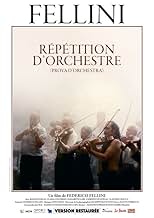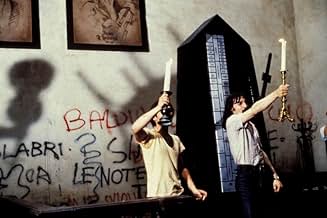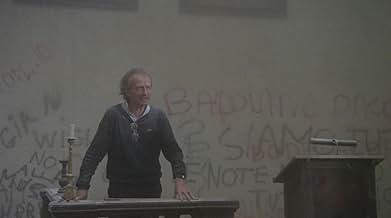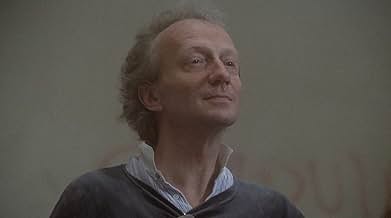IMDb-BEWERTUNG
7,1/10
5386
IHRE BEWERTUNG
Füge eine Handlung in deiner Sprache hinzuAn orchestra assembles for a rehearsal in an ancient chapel under the inquisitive eyes of a TV documentary crew, but an uprising breaks out.An orchestra assembles for a rehearsal in an ancient chapel under the inquisitive eyes of a TV documentary crew, but an uprising breaks out.An orchestra assembles for a rehearsal in an ancient chapel under the inquisitive eyes of a TV documentary crew, but an uprising breaks out.
- Auszeichnungen
- 1 Gewinn & 2 Nominierungen insgesamt
Nando Villella
- Cello player
- (as Ferdinando Villella)
Franco Javarone
- Bass tuba player
- (as Giovanni Javarone)
Andrew Lord Miller
- Oboe player
- (as Andy MIller)
Cesare Martignoni
- Clarinet player
- (as Cesare Martignon)
Filippo Trincia
- Head of orchestra
- (as Filippo Trincaia)
Empfohlene Bewertungen
Fellini's "Prova d'orchestra" was originally made for television, and there it should have stayed. As a cinematic event, it does not deliver. Yes, it's well directed and nicely acted, it has an interesting idea in it, but it's not enough for me to enjoy it. Eventually it looks like an exercise by some cinema student and not like a piece by Fellini, one of a few cinema genius of our time. I was disappointed, even though I enjoyed parts of it. My Grade: *** (out of *****)
This movie is one of my all-time favourites: through the "metaphor" of music, a universal picture of a power struggle is shown. Although this may appear 'thin', many layers of this struggle are peeled off. The German (looking) conductor appears to portray an easy comparison to Adolf Hitler, but another could be to Herbert von Karajan, the dictatorial conductor of the Berliner Philharmoniker. And then there is the great music score, that still lingers in my head, although I have not been able to find a recording of it (CD/LP?)(after almost 30 years!). I saw this movie again some years ago and it does not look dated. While I am not a Fellini adept and this movie was seen as one of his minor ones, this is a real classic to me.
I read some people saying that this film made no sense, and that it's just a orchestra rehearsal; it hurst how wrong they are. As any other Fellini, you have to scratch the surface, and you will find a great meaning. That's what I love about his films, they make you think! If you think nothing happened in this movie, go watch a Transformers film, you'll probably thing that there's a lot going on while there's nothing at all. While it may lack Fellini's characteristic powerful visuals, it has a very powerful meaning about politics, society and life. Awesome movie, and great for it's lenght
While the movie analyzes the roots and resolution of social revolt, what I like the most about it, is the personalized world-view of the musicians, as well as an exceptional music drive. My favorite Fellini and Rota. 10/10.
10Ymir4
This is likely the finest make-believe documentary that I have ever seen. The setting is a rundown Medieval Roman chapel, now an oratorio where an orchestra gathers. A television crew is making a documentary about this orchestra (while the orchestra is dealing with a union dispute). The bulk of the film's first half focuses on individual musicians, many of whom reminisce about their first encounter with the instrument they play. When the musicians talk about their instrument, they often share thoughtful and stimulating metaphors about the meaning and the function of their instrument. There are a few times during the film where the action is interrupted by a large rumble in the building. We don't know what this is exactly until the end of the film. The film transforms from poetic, to pure comical delight, to complete chaos, to lyrical beauty when the musicians play the music.
Composer Nino Rota's contribution was an immense one. He composed all of the pieces the musicians play in the film, and I believe they the music is absolutely wonderful (my personal favorite of Rota's compositions for "Orchestra Rehearsal" being the final piece the orchestra performs). This was the last time Rota scored a Fellini film, he died the next year.
I also must comment on the top-notch cinematography, which is quintessentially Felliniesque (ex. incredible long shots of the orchestra playing, shots of musicians lined up in very particular angles, and a couple of sweeping pans).
Anybody who loves orchestral music will like this film to some degree. I happen to immensely love Fellini, Rota, AND orchestral music, so for me, this film is nothing short of absolutely marvelous entertainment!
Composer Nino Rota's contribution was an immense one. He composed all of the pieces the musicians play in the film, and I believe they the music is absolutely wonderful (my personal favorite of Rota's compositions for "Orchestra Rehearsal" being the final piece the orchestra performs). This was the last time Rota scored a Fellini film, he died the next year.
I also must comment on the top-notch cinematography, which is quintessentially Felliniesque (ex. incredible long shots of the orchestra playing, shots of musicians lined up in very particular angles, and a couple of sweeping pans).
Anybody who loves orchestral music will like this film to some degree. I happen to immensely love Fellini, Rota, AND orchestral music, so for me, this film is nothing short of absolutely marvelous entertainment!
Wusstest du schon
- PatzerWhen they are interviewing the first violinists, the harpist in the background is clearly not playing but harp music is audible.
- VerbindungenFeatured in Die wunderbare Reise der Lucy - Auf der Suche nach Fellini (2017)
Top-Auswahl
Melde dich zum Bewerten an und greife auf die Watchlist für personalisierte Empfehlungen zu.
- How long is Orchestra Rehearsal?Powered by Alexa
Details
- Erscheinungsdatum
- Herkunftsländer
- Sprachen
- Auch bekannt als
- Orchestra Rehearsal
- Drehorte
- Produktionsfirmen
- Weitere beteiligte Unternehmen bei IMDbPro anzeigen
- Laufzeit
- 1 Std. 12 Min.(72 min)
- Sound-Mix
- Seitenverhältnis
- 1.37 : 1
Zu dieser Seite beitragen
Bearbeitung vorschlagen oder fehlenden Inhalt hinzufügen


























